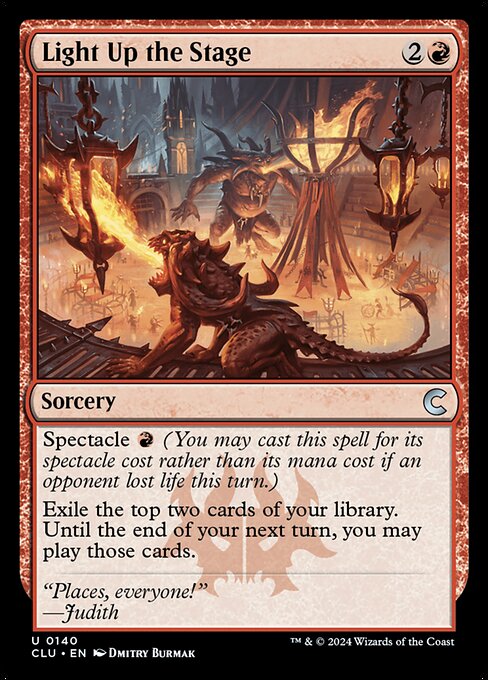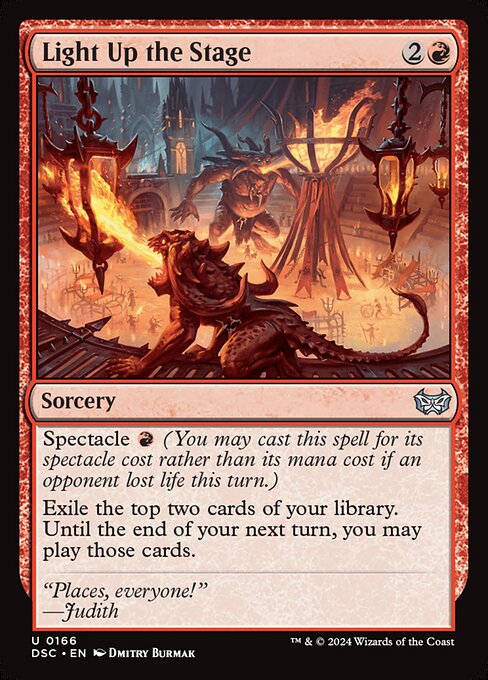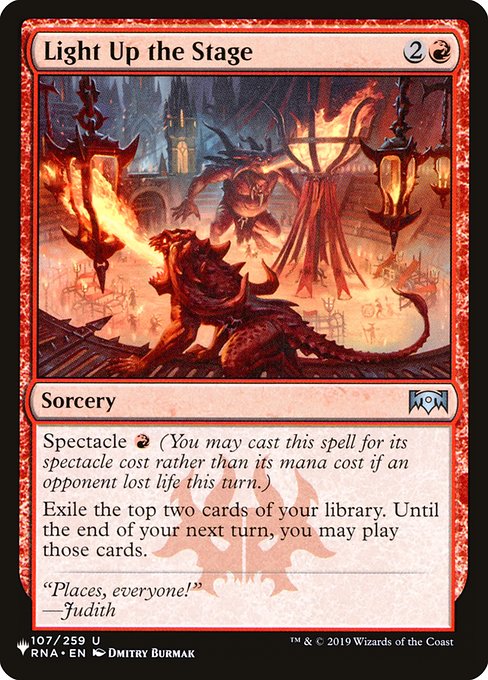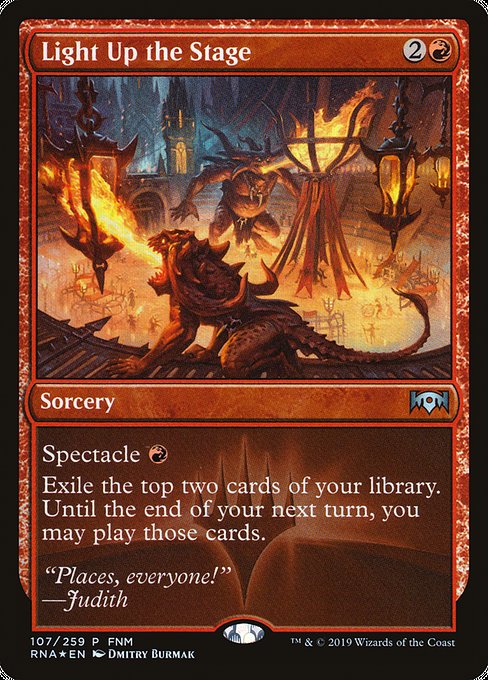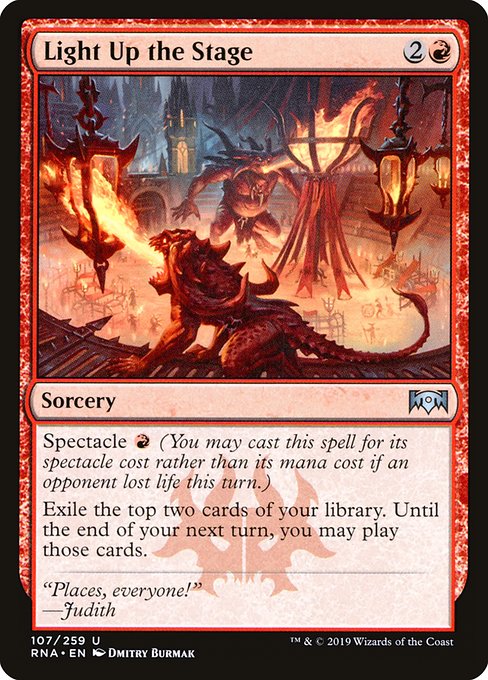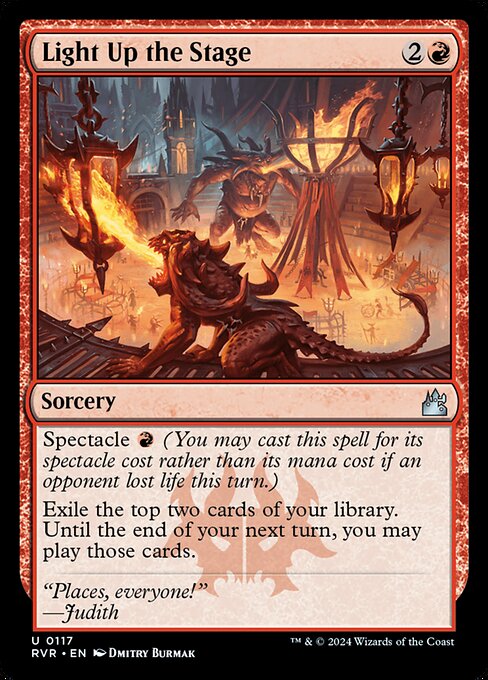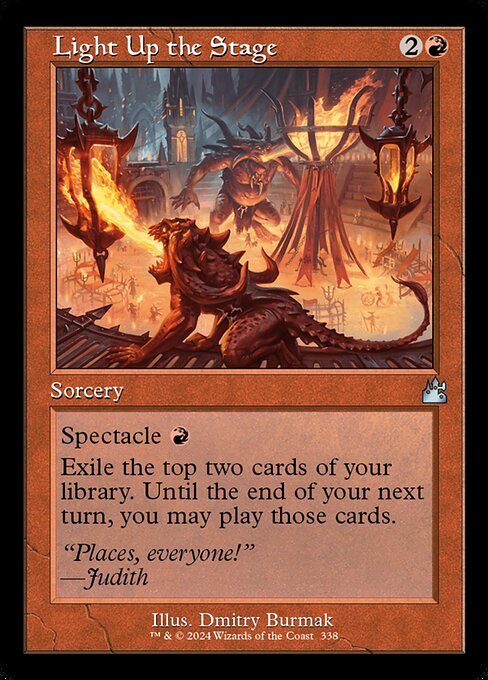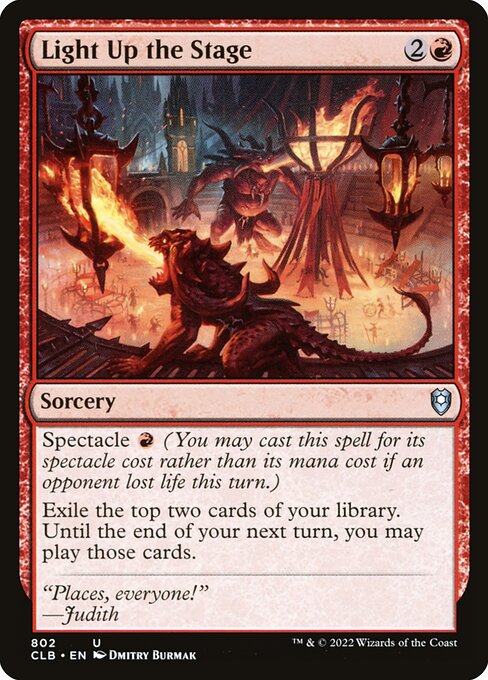

Clique pour retourner la carte
In Szene setzen
Hexerei
Spektakel (Du kannst diesen Zauberspruch für seine Spektakel-Kosten anstatt seiner Manakosten wirken, falls ein Gegner in diesem Zug Lebenspunkte verloren hat.)
Schicke die obersten zwei Karten deiner Bibliothek ins Exil. Du kannst die Karten bis zum Ende deines nächsten Zuges spielen.
Schicke die obersten zwei Karten deiner Bibliothek ins Exil. Du kannst die Karten bis zum Ende deines nächsten Zuges spielen.
standard
future
historic
gladiator
pioneer
explorer
modern
legacy
pauper
vintage
penny
commander
brawl
alchemy
paupercommander
duel
oldschool
premodern
Rulings
Damage dealt to a player causes that player to lose that much life.
Spectacle doesn't change when you can cast the card. For example, you can't cast a sorcery with spectacle during an opponent's turn unless another effect allows you to do so, even if that player has lost life this turn.
A card's spectacle cost is the same no matter how much life your opponents lost or how many opponents lost life.
Casting an exiled card causes it to leave exile. You can't cast it multiple times.
If you don't play a card exiled this way, it remains in exile.
Light Up the Stage doesn't change when you can play the exiled cards. For example, if you exile a sorcery card, you can cast it only during your main phase when the stack is empty. If you exile a land card, you can play it only during your main phase and only if you have an available land play remaining.
To determine the total cost of a spell, start with the mana cost or alternative cost you're paying (such as a spectacle cost), add any cost increases, then apply any cost reductions. The mana value of the spell remains unchanged, no matter what the total cost to cast it was.
In a multiplayer game, if an opponent loses life and later that turn leaves the game, you can cast a spell for its spectacle cost. (If a player leaves the game during their turn, that turn continues without an active player.)
Spectacle doesn't change when you can cast the card. For example, you can't cast a sorcery with spectacle during an opponent's turn unless another effect allows you to do so, even if that player has lost life this turn.
A card's spectacle cost is the same no matter how much life your opponents lost or how many opponents lost life.
Casting an exiled card causes it to leave exile. You can't cast it multiple times.
If you don't play a card exiled this way, it remains in exile.
Light Up the Stage doesn't change when you can play the exiled cards. For example, if you exile a sorcery card, you can cast it only during your main phase when the stack is empty. If you exile a land card, you can play it only during your main phase and only if you have an available land play remaining.
To determine the total cost of a spell, start with the mana cost or alternative cost you're paying (such as a spectacle cost), add any cost increases, then apply any cost reductions. The mana value of the spell remains unchanged, no matter what the total cost to cast it was.
In a multiplayer game, if an opponent loses life and later that turn leaves the game, you can cast a spell for its spectacle cost. (If a player leaves the game during their turn, that turn continues without an active player.)
Rulings
Damage dealt to a player causes that player to lose that much life.
Spectacle doesn't change when you can cast the card. For example, you can't cast a sorcery with spectacle during an opponent's turn unless another effect allows you to do so, even if that player has lost life this turn.
A card's spectacle cost is the same no matter how much life your opponents lost or how many opponents lost life.
Casting an exiled card causes it to leave exile. You can't cast it multiple times.
If you don't play a card exiled this way, it remains in exile.
Light Up the Stage doesn't change when you can play the exiled cards. For example, if you exile a sorcery card, you can cast it only during your main phase when the stack is empty. If you exile a land card, you can play it only during your main phase and only if you have an available land play remaining.
To determine the total cost of a spell, start with the mana cost or alternative cost you're paying (such as a spectacle cost), add any cost increases, then apply any cost reductions. The mana value of the spell remains unchanged, no matter what the total cost to cast it was.
In a multiplayer game, if an opponent loses life and later that turn leaves the game, you can cast a spell for its spectacle cost. (If a player leaves the game during their turn, that turn continues without an active player.)
Spectacle doesn't change when you can cast the card. For example, you can't cast a sorcery with spectacle during an opponent's turn unless another effect allows you to do so, even if that player has lost life this turn.
A card's spectacle cost is the same no matter how much life your opponents lost or how many opponents lost life.
Casting an exiled card causes it to leave exile. You can't cast it multiple times.
If you don't play a card exiled this way, it remains in exile.
Light Up the Stage doesn't change when you can play the exiled cards. For example, if you exile a sorcery card, you can cast it only during your main phase when the stack is empty. If you exile a land card, you can play it only during your main phase and only if you have an available land play remaining.
To determine the total cost of a spell, start with the mana cost or alternative cost you're paying (such as a spectacle cost), add any cost increases, then apply any cost reductions. The mana value of the spell remains unchanged, no matter what the total cost to cast it was.
In a multiplayer game, if an opponent loses life and later that turn leaves the game, you can cast a spell for its spectacle cost. (If a player leaves the game during their turn, that turn continues without an active player.)
Votre collection ? vos decks ?
Envie de gérer votre collection et/ou créer des decks ?
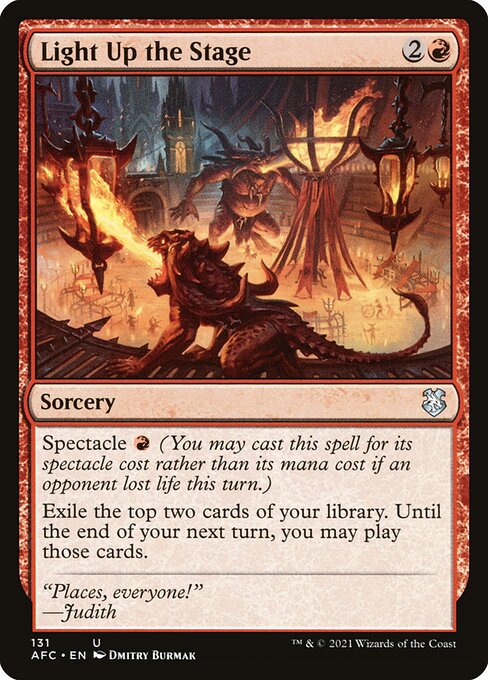
 0
0
 0.31€
0.31€
